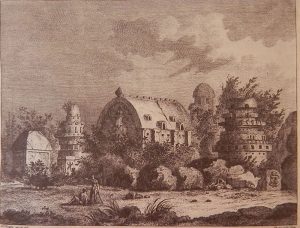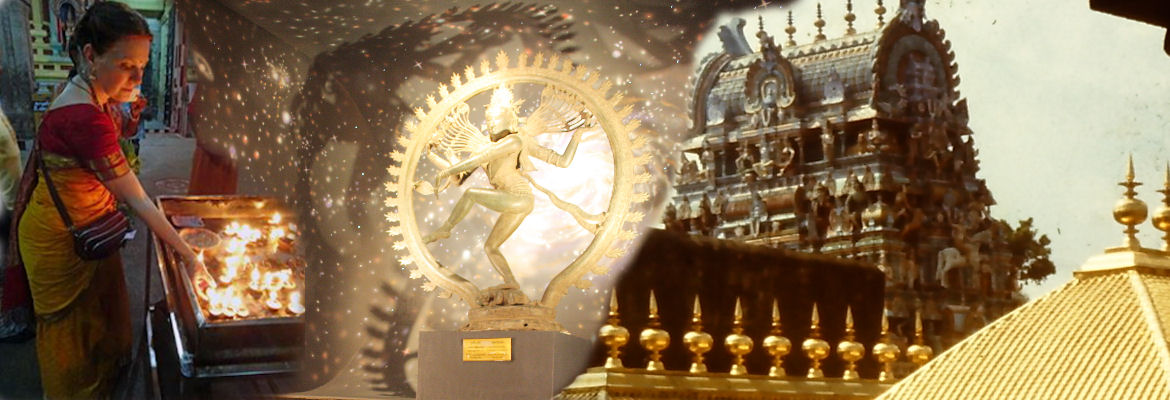In the 18th century one of the Westerners who lived on the Coromandel coast of India and wrote about his experiences was Jacob Haafner. He lived in Sadras for some years where he worked as a bookkeeper. Here I bring you the second part of a series of posts giving the translation of his writing about Mahabalipuram. He was the first Western traveller who gave a comprehensive description of this monumental site.

In this valley it is always teeming with all kinds of birds that have made it their home in more numbers than I’ve ever seen elsewhere. From hill to hill the cooing of the innumerable turtledoves echoed which have here their nests in the cracks of the rocks and the hollows of the ruins without being disturbed.
However great was the curiosity of mister Cockrel, I advised him, however, to postpone them until we had taken our lunch, and the sun was down somewhat; while it would increase the severe headache, of which he had complained in the morning. He remained then in the Chauderie of the village, while I climbed up one mound, and sat myself down on the top of it, while surveying the grand spectacle.
My imagination carried me back to the days of antiquity, to unknown and bygone ages when the great Joudishter held sway here, and from here send out his orders to all corners of his vast empire.
These mighty ruins, these grand monuments of time immemorial, filled my soul with mournful contemplations.
What an irrefutable proof of the futility and inconstancy of sublunary things lie in the contemplation of these great and mighty, yet now gone to naught and dilapidated city, and the memory and comparison of her previous and present state! Where is the city of the twenty gates and one hundred palaces? Where is her former glory and splendor, where are her innumerable inhabitants?
The beautiful and magnificent city of the victorious Joudishter (*Joudishter, a famous prince, one of the five sons of Pandou, the Heroes of the Mahabaroth) has decayed to a miserable little village. In small straw huts a few poor Brahmins now inhabit this place where she was once standing. This extended area is now dominated by a foreign power and the unfortunates who inhabit today groan under the slavish tyranny of the Europeans.
Nothing of this famous city remains but the awesome colossus, the sad skeleton of the former greatness!
Loneliness and deathly silence now take the place of the incessant din of innumerable crowds that used to swarm together. The songs, the celebrations, the processions and sacrifices to the Gods, have fallen silent, – the temples stand alone, surrounded with dense and impenetrable thicket. Snakes and lizards live there and the fierce viper has here her nest. From the walls hang withered vines and braiding ivy. Brown moss covers the walls; through the hollow temples now the wind whistles and where the songs and cheers echoed, one now hears the night owl.
Here, by this way, it may be, where the victorious Joudishter, sitting on his Roth (victory chariot), drawn by elephants, and surrounded by his warriors, triumphing over his enemies, returned, or to punish them, went to the Warfield. Here possibly he showed himself to his subjects, to exercise justice and to hear their complaints. Here possibly stood the heralds, proclaiming his praise, and inviting the people for public celebrations. But all the pomp of the court, all the palaces and triumphal arches are gone! Even the name of the great prince and his successors can only be found in the mysterious fabulous stories of the Mahabharata.
Is this the end of people’s labor? Must thus disappear into nothingness his works, raised by thousands of hands and with unspeakable effort and patience, thus be submerged into oblivion his actions, his glory?
O Maveliewarom! It is in your school that the vain and imperious can learn to be humble. They can learn more here than all of what is being said by philosophers and theologians on the vanity and inconstancy of terrestrial things. In this mood, my heart full of thoughts about impermanence I left the hill and I returned again to my travel companions. We took a hasty lunch, and then proceeded on our way.
You can read the full chapter HERE

Ravi
Thank you for the translation